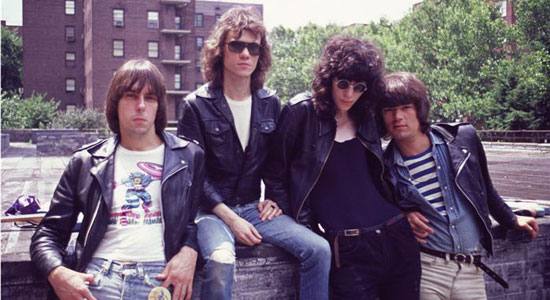The Pogues on record are never short of inspirational, and in person, they might be a life-changing experience. This hackle-raising blend of traditional Irish folk music, politically charged broadsides and electric rock ‘n’ roll, delivered by charismatic frontman Shane MacGowan flanked by a grizzled band of veterans that includes penny-whistle virtuoso/alternate vocalist Spider Stacy, was formed in the King’s Cross district of north London in 1982. Despite occasional time off for good behavior, they’ve been playing ever since and have a handful of festival dates planned for this summer. Here’s hoping it lasts for at least another 10 years. We are proud to say that Stacy, who is currently appearing as a street musician in season two of HBO’s Treme, will be guest editing magnetmagazine.com all week. Read our new Q&A with him.

Stacy: It’s pointless for me to do this without mentioning the Ramones. By the mid-’70s, I had retreated into a hinterland of disengagement as far as most music was concerned, using it mainly has a soundtrack for mind-numbing afternoons of drug-taking. Which is pretty much what most middle-class kids did back then. Our working-class contemporaries had it much better, or so it seemed, with all that football violence and their achingly unreachable girlfriends you were terrified of fancying. I still bought the weekly music press from time to time and listened to John Peel’s radio show so was aware of the growing reputations of bands like Kilburn & The High Roads, Dr. Feelgood and Eddie & The Hot Rods. Peel was possibly the most important figure in the British alternative/independent music scene ever. His show was only ever scheduled on weeknights between 10 p.m. and 12 a.m., yet especially after the explosion of punk (which he had been instrumental in forcing the BBC to even consider playing) he became an extremely influential figure who’d assiduously play pretty much anything that was sent to him as long as felt that it possessed some charm or merit (to someone, somewhere), and it was also through him that I was able to pick up the stirrings of something else going on. It was on Peel’s show that I first heard the Ramones. “I Wanna Be Your Boyfriend,” so mangled and distorted by my cheap Japanese transistor that they sounded more like a Brill Building Throbbing Gristle on Temazepam or quaaludes, if you prefer. Used until killed by unremitting hard labour, transistor radios were one of the webs that held the world together back then.
In the summer of ’76, there was a dance at the local girls’ grammar school, so naturally I went. It was a really cool party; the Henrietta Barnett girls had a certain, not entirely undeserved, reputation, and the music was good: David Bowie, Bob Marley, the Stones and quality ’50s/’60s/early-’70s stuff. And then someone put on “Blitzkrieg Bop,” and I never wanted to hear another record again. And really, that’s about it. I could add that although I had my epiphany, I had already missed the Ramones opening for the Flaming Groovies at Dingwalls, London, in April of that year, but I caught them next year at the Roundhouse. at the time the best venue in London and in its day one of the bastions of London’s counterculture. They were supported by the criminally ignored Saints and an extraordinarily assured, intense performance from the Talking Heads that would have blown any other headliners into oblivion. I’ve been to many, many gigs down the years, and nothing I’ve ever witnessed has remotely compared to the Ramones that night. It’s so fucking sad that of the four bruddas, only Tommy is still with us.
You’ve all seen so much Ramones footage, so videos of Dr. Feelgood doing “Roxette” and Kilburn & The High Roads filmed at the Hope & Anchor, Islington, London (everyone played there).






